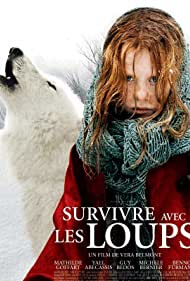Surviving with Wolves Soundtrack (2007)

Buy on Amazon Play and download Soundtracks
Survivre avec les loups
Sopravvivere coi lupi
Sobreviver Com Lobos
Synopsis
In 1942, the young Jewish girl Misha, her Russian mother Gerusha and her German father Reuven hide from the Germans in a small house in Ardennes, Belgium. Misha is very connected to her mother that advises her that if one day a person comes to her saying "love of my life", she would follow him or her without any question. When her parents are captured by the Nazis, Misha is delivered to a German family and the abusive matriarch gives a bad treatment to the girl. However, she finds support in the family of Ernest and his deranged wife Marthe that supplies groceries to foster family. Misha loves Ernest's dogs and the old man gives a compass to her and tells that her parents have been sent to East to forced labor. When the old couple is denounced for sheltering the girl and arrested by the Germans, Misha flees through the woods heading east. Along her journey seeking out her parents, she lives and survives with pack of wolves and crosses Germany, Poland reaching Ukraine. When she sees that Brussels have been released by the allied force, she returns to her hometown and reaches it in March 1945 almost dead, sick and with lice and malnourished. However, Ernest identifies the girl that does not accept that her parents had died in the concentration camp of Sonnenburg.
Download and play the Soundtrack list
| Play | Title | Artist |
|---|---|---|
|
Surviving with Wolves
|
||
|
Cauchemar de Misha
|
||
|
Délire de Misha
|
||
|
Fuite de Misha
|
||
|
Vu d'ici
|
||
|
Chanson de toile
|
||
|
In the lake
|
||
|
Au lever du soir
|
||
|
Piano Trio in E flat D929
|
Franz Schubert:
Writer
|
|
|
Notturno op148 (posth.) in E flat Major
|
Franz Schubert:
Writer
|
|













